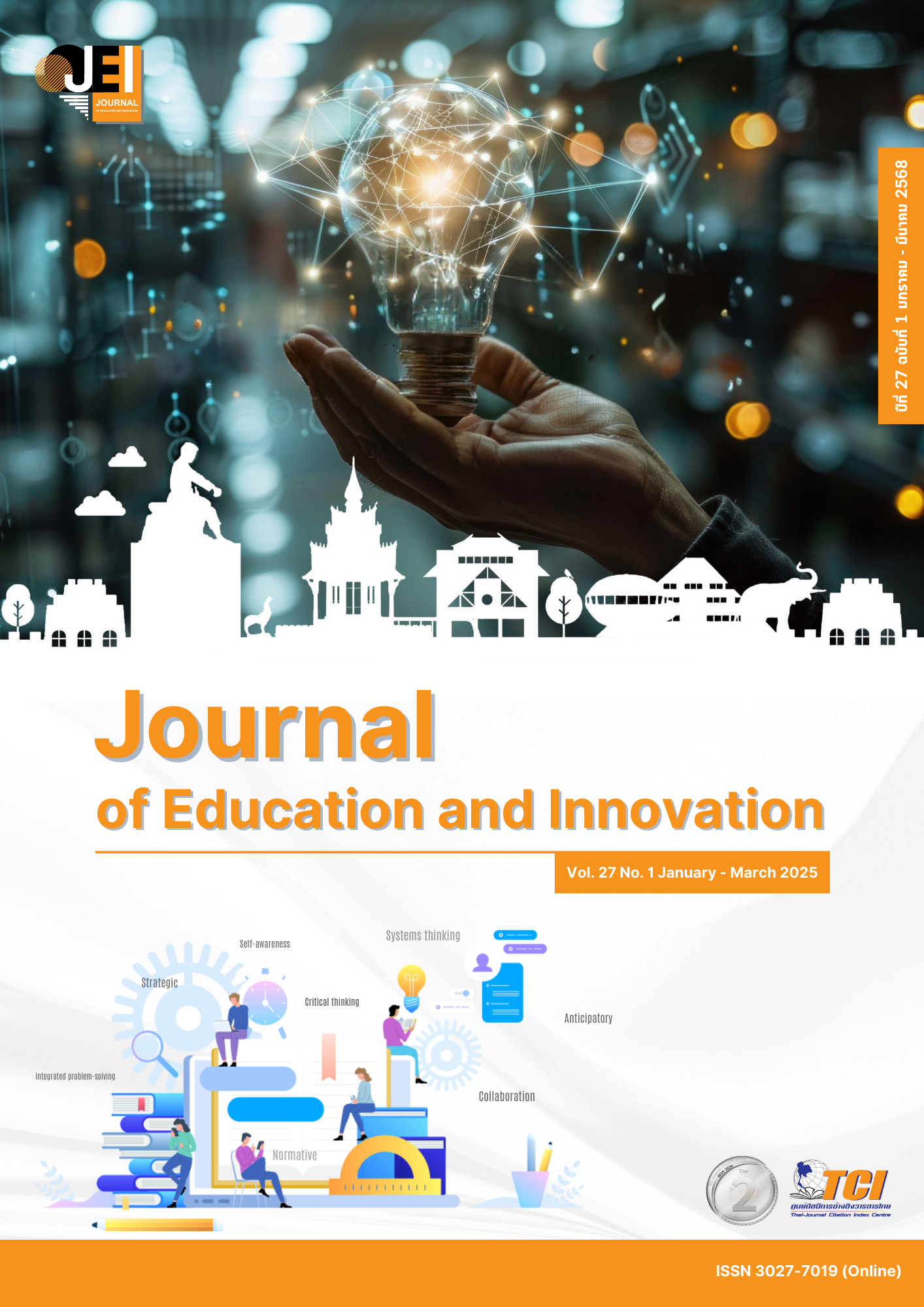ธรรมชาติหายไป: ผลกระทบและวิธีการฟื้นฟูสำหรับเด็กปฐมวัยในยุคดิจิทัล
Main Article Content
บทคัดย่อ
การสำรวจผลกระทบของยุคดิจิทัลที่มีต่อเด็กปฐมวัย โดยเฉพาะการขาดธรรมชาติที่อาจนำไปสู่ปัญหาด้านพัฒนาการ การศึกษาข้อมูลหลักการ แนวคิดและงานวิจัยต่างๆ ได้แสดงให้เห็นถึงความสำคัญของธรรมชาติในกระบวนการเรียนรู้และพัฒนาของเด็กปฐมวัยอย่างมาก ซึ่งธรรมชาติหายไปในยุคปัจจุบัน เป็นสาเหตุสำคัญทำให้เด็กปฐมวัยขาดโอกาสการเล่นในแหล่งเรียนรู้ ที่หลากหลายจากธรรมชาติสิ่งแวดล้อมรอบตัว ดังนี้ 1) ครอบครัวขาดเวลาคุณภาพที่ได้อยู่ร่วมกัน 2) การอบรมเลี้ยงดู ที่เปลี่ยนแปลงไปใช้สื่อเทคโนโลยีดิจิทัลเร่งให้เด็กเก่งวิชาการ 3) การเร่งเรียนเขียนอ่านที่เข้มข้น 4) ขาดการสร้างวินัยเชิงบวก 5) ขาดโอกาสการได้ออกไปเล่นอิสระสัมผัสกับธรรมชาติสิ่งแวดล้อม และ 6) ขาดพื้นที่สภาพแวดล้อมที่เพียงพอด้วยธรรมชาติรอบตัว ทั้งนี้พ่อ แม่ ผู้ปกครอง และครูปฐมวัยเป็นกลไกสำคัญในการพัฒนาเด็กปฐมวัยยุคดิจิทัลไม่ให้ห่างไกลจากธรรมชาติสิ่งแวดล้อม หรือมีความฉลาดทางดิจิทัล (Digital Intelligence Quotient: DQ) ดังนี้ 1) ใช้เวลาคุณภาพสร้างความสัมพันธ์ร่วมกันในครอบครัว 2) ฝึกระเบียบวินัย 3) ฝึกการควบคุมตนเอง ยั้งคิดไตร่ตรอง 4) การเลือกใช้โปรแกรมหรือแอปพลิเคชันที่มีคุณภาพให้เหมาะสมกับวัยและใช้ไปด้วยกันกับเด็กในช่วงเวลาตามที่กำหนด และ 5) กระตุ้นส่งเสริมสุขภาพเด็กด้วยการ “กิน กอด เล่น เล่า และนอน” โดยมีหลักการสร้างสภาพแวดล้อมเพื่อเปิดโอกาสให้เด็กได้เล่นท่ามกลางธรรมชาติสิ่งแวดล้อม มีดังนี้ 1) ศึกษาสภาพธรรมชาติสิ่งแวดล้อมทั่วไปเพื่อสร้าง ปรับปรุง เปลี่ยนแปลง 2) สร้างพื้นที่แห่งการเรียนรู้โลกภายนอกห้องเรียน หรือนอกบ้าน 3) สร้างและจัดสภาพแวดล้อมด้วยพื้นที่สีเขียวที่เอื้อต่อการใช้ประสาทสัมผัสทุกส่วนของเด็ก 4) พ่อ แม่ ผู้ปกครอง และครูปฐมวัยเป็นสิ่งแวดล้อมสำคัญที่สุดของเด็กในการเล่นร่วมกัน และ 5) การปรับสมดุลในชีวิตประจำวันบริหารจัดการการใช้สื่อเทคโนโลยีดิจิทัล เพื่อเปิดโอกาสให้เด็กได้เล่นอิสระท่ามกลางธรรมชาติสิ่งแวดล้อมอย่างสนุกสนานปลอดภัย ซึ่งประกอบด้วยวิธีการจัดสภาพแวดล้อม ดังนี้ 1) ศึกษา และสำรวจสื่อ วัสดุ อุปกรณ์ ที่เหมาะสมกับเด็กปฐมวัย 2) การพัฒนาสภาพแวดล้อมที่เอื้อต่อการเล่นอิสระ มีชีวิตชีวา มีธรรมชาติ น่าผจญภัย 3) การจัดสภาพแวดล้อมให้เป็นพื้นที่การเล่นชั่วคราว 4) จัดการจัดสภาพแวดล้อมให้เป็นพื้นที่การเล่นถาวร เป็นการเล่นเรียนรู้เชิงธรรมชาติสิ่งแวดล้อมที่บูรณาการเทคโนโลยีดิจิทัล อย่างเหมาะสมกับการเรียนรู้ของเด็กปฐมวัยผ่านการค้นพบด้วยตนเองของเด็ก ได้มีโอกาสใช้ทักษะการคิดอย่างมีวิจารณญาณในชีวิตประจำวันอย่างสมดุล ดังนี้ 1) การได้เล่นสัมผัสกับธรรมชาติสิ่งแวดล้อม 2) มีกิจกรรมการเล่นที่หลากหลายให้เด็กได้ใช้ชีวิตให้ห่างไกลสื่อเทคโนโลยีดิจิทัล และ 3) เด็กมีโอกาสได้สร้างสรรค์กิจกรรมด้วยดนตรีและกีฬาผ่านธรรมชาติสิ่งแวดล้อม
Article Details

อนุญาตภายใต้เงื่อนไข Creative Commons Attribution-NonCommercial-NoDerivatives 4.0 International License.
เจ้าของบทความมิได้คัดลอก หรือละเมิดลิขสิทธิ์ของผู้ใด หากเกิดการละเมิดลิขสิทธิ์ ไม่ว่าวิธีใด หรือการฟ้องร้องไม่ว่ากรณีใด ๆ ที่อาจเกิดขึ้นได้ กองบรรณาธิการวารสารศึกษาศาสตร์ ไม่มีส่วนเกี่ยวข้องทั้งสิ้น ให้เป็นสิทธิ์ของเจ้าของบทความที่จะดำเนินการ
เอกสารอ้างอิง
Allen Cooper National Wildlife Federation. (2015). Nature and the Outdoor Learning Environment: The Forgotten Resource in Early Childhood Education. International Journal of Early Childhood Environmental Education, 3(1), 85-97.
Amarin Baby & Kids. (2021). Thai children at risk of nature deficit disorder, trapped in a virtual world. Retrieved from https://www.amarinbabyandkids.com/tips-for-parents/children-nature-deficit-disorder/
Anawatsiriwong, T., & Anawatsiriwong, P. (2018). MIDL for kids: Media and digital literacy for early childhood. Bangkok: Superior Printing House.
Athanupan, M, L. (2018). Growing Plants and Growing Children: The gardening activity for young children. Veridian E-Journal, Silpakorn University, 11(3), 177-191.
Câmpan, A. S., & Bocos, M. (2019). The Outdoor Activities in Preschool Education. In V. Chis, & I. Albulescu (Eds.), Education, Reflection, Development –ERD 2018, vol 63. European Proceedings of Social and Behavioral Sciences (pp. 1-6). Future Academy. DOI: 10.15405/epsbs.2019.06.1
Casey, T. (2020). Play to Build a Happy World: Guidelines for Organizing Play Environments for Children (Translated by Nareumol Ruenwai). Pathum Thani: Walk on Cloud.
Chueasataphonsiri, T. (2022). “Transparent screens”: A threat to the development and behavior of children in the digital age. Retrieved from https://op.mahidol.ac.th/ga/posttoday-45
Jakkham, T., Intasing, S., & Suwatanan, S. (2023). Development of local identity integrated learning unit to promote creative thinking ability and sustainable coexistence with nature and science competency for grade 4 students. Chiang Mai University Journal of Curriculum and Teaching, 2(2), 26-39.
Kerdplang, P. (2011). The Results of Using a Project-Based Experience Activity Set Based on the Sufficiency Economy Concept for Early Childhood (Master thesis). Bangkok: Rajamangala University of Technology Thanyaburi.
Martha, C. M., & Marianne, E. K. (2016). Across the Spectrum: Resources for Environmental Educators. Retrieved from https://dg56ycbvljkqr.cloudfront.net/sites/default/files/eepro-post-files/acrossthespectrum_8-1-16.pdf
Office of the Education Council Secretariat, Ministry of Education. (2020). Guidelines for the development of learning resources in the digital era appropriate for early childhood learners. Retrieved from http://www.sesalpglpn.go.th/wp-content/uploads/2021/05/book43-64.pdf
Pantuworakul, K., & Nuansri, M. (2019). Young children as digital citizens: Opportunity or risk. Journal of Education Studies, 47(2), 1-23.
Petchruanthong, S., & Tatsamai, K. (2023). Early childhood development through learning from eco-gardens: Health promotion media for early childhood in families and communities. Retrieved from https://www.thaihealth.or.th/?p=349744
Phitaksinsuk, T. (2019). The effects of early childhood education crisis on Thailand’s future. Journal of Early Childhood Education Management, 1(1), 77-89.
Pholittponkarnpim, A. (2021). Thai children at risk of illness from nature deficit disorder, trapped in a virtual world. Retrieved from https://www.amarinbabyandkids.com/tips-for-parents/children-nature-deficit-disorder/
Rahima Baldwin Dancy. (2005). You Are Your Child’s First Teacher [Translated by Suwanna Chokprachakchad]. Bangkok: SE-EDUCATION.
Ratana, P. (2021). Early childhood education management for citizenship in the digital world: Lessons from abroad. Journal of Social Research and Development, 3(4), 1-23.
Rogow, F. (2002). ABCs of media literacy: What can preschoolers learn? Retrieved from www.medialit.org/reading-room/abcs-media-literacy-what-can-pre-schooolers-learn
Sangmala, N., Charoensub, T., Uarsakchai, S., & Moosikajaroen, W. (2024). The Trend of Critical Thinking. Journal of Roi Kaensarn Academi, 9(4), 838-853.
Sithisoman, S. (2017). A study on the management of digital media for early childhood (Doctoral dissertation). Nakhon Pathom: Silpakorn University.
Sokampa, A. (2023). Best practice performance for early childhood teachers: Nature-based learning. Retrieved from http://innodev.moe.go.th/document/innovation-100.pdf
Srichanchai, J., & Tilakarayasrup, S. (2021). The effect of smartphone usage in early childhood: Nursing role. Journal of MCU Nakhondhat, 8(10), 113-124.
Suthiprapa S., Hiruncholotorn P., & Butrakattanyu O. (2022). Effect on environmental awareness among early childhood children through the introduction of an activity set under “Knowledge of Environmental Conservation among preschool children”. Journal of Educational Innovation and Research, 6(2), 352-365.
Tatsutaka, Y. (2021). Nature Deficiency Disorder [Translated by Atiporn Borinayakanon]. Bangkok: Foundation for Children with Disabilities.
Thai Health Promotion Foundation (ThaiHealth). (2020). Policy on 'Early Childhood' Sparks a Call for Solutions to Overhaul Childcare Systems for the 21st Century. Thai Post. Retrieved from https://www.thaipost.net/main/detail/83767
Thai Health Promotion Foundation (ThaiHealth). (2020). Self-Reliant Health Promotion Guide for the New Normal: Recommendations for Achieving Good Health Starting from Oneself and Daily Life. Retrieved from https://www.thaipost.net/main/detail/83767
The Department of Health. (2018). Progress Report on the Indicators of Thai Children's Growth and Age-Appropriate Development. Retrieved from https://nich.anamai.moph.go.th/th/general-of-50/204371.
Udomrati, W. (2022). Developing knowledge to promote and restore the development of early childhood after the COVID-19 pandemic. Retrieved from https://ecd-covidrecovery.rlg-ef.com/learning-loss2-95/
Yamrung, R., Suthasinobol, K., & Jantraphirom, P. (2022). The age of change and challenges in childhood development. Journal of Home Economics, 65(2), 1-13.
Yenjabok, P., & Thammanitayakul, C. (2020). “The Round World Called Digital” Handbook. Bangkok: Safe and Creative Media Development Fund.


